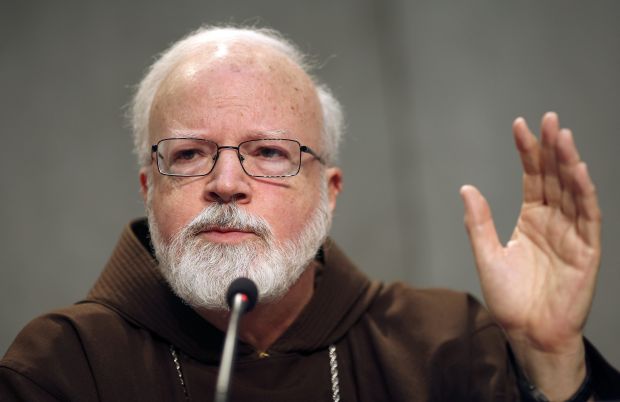
Cardinal Sean P. O’Malley, member of the Pontifical Commission for the Protection of Minors, gestures as he speaks during their first briefing at the Holy See press office at the Vatican May 3. (CNS photo/Alessandro Bianchi, Reuters)
VATICAN CITY (CNS) — The new papal commission for protecting minors from clerical sex abuse will recommend stricter standards for accountability of abusers and those who fail to protect children, and will fight widespread denial of the problem within the church, said Cardinal Sean P. O’Malley of Boston.
“In some people’s minds, ‘Oh, this is an American problem, it’s an Irish problem, it’s a German problem,'” the cardinal told reporters May 3. “Well, it’s a human problem, and the church needs to face it everywhere in the world. And so a lot of our recommendations are going to have to be around education, because there is so much ignorance around this topic, so much denial.”
The cardinal spoke on the third and final day of the commission’s first meeting at the Vatican. Reading a statement on behalf of the entire eight-member panel, he said the commission planned to draft statutes for approval by Pope Francis to clarify the body’s “nature, structure, activity and the goals.”
[hotblock]
“The commission will not deal with individual cases of abuse, but we can make recommendations regarding policies for assuring accountability and best practice,” the statement said.
Later, in response to a reporter’s question, the cardinal said such policies were necessary to fill gaps in church law.
“Our concern is to make sure that there are clear and effective protocols to deal with situations where superiors of the church have not fulfilled their obligations to protect children,” he said. “There are, theoretically I guess, canons that could apply here, but obviously they have not been sufficient.”
“Our concern about accountability is accountability for everyone in the church, regardless of what their status is,” the cardinal said.
Asked about a recent directive from the Italian bishops’ conference stating that bishops have no legal obligation to report accusations of sex abuse to the police or other civil authorities, Cardinal O’Malley said: “Obviously, accountability should not be dependent upon legal obligations in the country when we have a moral obligation.”
The commission announced its plans to nominate additional members for appointment by the pope. Cardinal O’Malley said preserving the commission’s independence required a strong presence of lay volunteers, and that sitting members hoped to be joined by more victim-survivors. So far, the only survivor on the commission is Marie Collins, Irish founder of an organization to help sex abuse victims.
The cardinal said adding geographical diversity to the commission – currently made up of six Europeans, a North American and a South American – was also a priority, largely to ensure that awareness of sex abuse extends to all parts of the church.
Cardinal O’Malley was joined on stage at the briefing by Collins and another member of the commission, Jesuit Father Hans Zollner. The other five members sat with reporters in the audience.
Collins seconded the cardinal’s emphasis on education, recalling a 2012 symposium on sex abuse at Rome’s Pontifical Gregorian University, where she said she had been “shocked” by the “sincerity of some bishops who felt the problem did not exist in their country.”
Asked to comment on remarks by Pope Francis, in a March interview, that the church had done “perhaps more than anyone” to solve the problem of sex abuse, Collins she had “found difficulty” with the pope’s words but was now “looking forward.”
“In many countries, there are improvements,” she said. “What the Holy Father said is true, but it is not universal.”
Asked about the relevance of sex abuse to the Vatican’s scheduled May 5-6 appearance before a United Nations committee monitoring adherence to an anti-torture treaty, Collins said “many survivors would probably say their abuse was torture, but it’s an entirely different thing, a separate matter altogether from state-sponsored torture.”
The commission held its meetings at the Vatican guesthouse, where Pope Francis lives. The members met the pope on two occasions during their stay, once after a morning Mass and once for a photo opportunity, but he did not address them as a group or attend any of their sessions. The cardinal said he expected the pope to address the commission once all its members had been appointed.
PREVIOUS: Cardinal: Officials who support abortion should not receive Communion
NEXT: U.N. Committee Against Torture asks Vatican about sex abuse scandal



Share this story